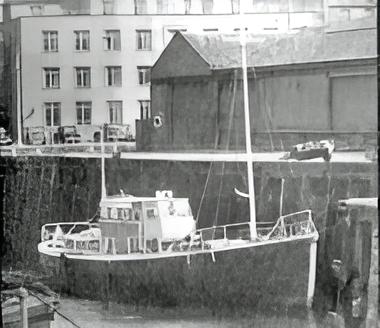Ship details: An ex Admiralty 70 ton 65 feet fishing vessel was said to have been purchased to be converted into a radio ship in Scotland.

The very small “Ellen” had the call letters: GBLN – London. The financial backer was to be “The World Tomorrow” radio program which then was slated for Radio Atlanta until she merged with Radio Caroline. The next stop was Radio London where it did finance the entire running of the station. GBLN was the sister to the other station “GBOK” on board the lightship Lady Dixon. The main sponsor of the “Voice of Slough” was to be Herbert W. Armstrong from 8-8:30 PM nightly. (He first went on Luxembourg for two nights a week in the 1950s, and then looked at “Radio Mercur” … long before the “GBLN” project.) Behind his “World Tomorrow” programs there seems to have been some USA government money aimed at stopping the independent “United States of Europe” movement of de Gaulle, in favor of a Europe under tow to the USA. [Information by Paul John Lilburne-Byford]
The information I have regarding the “Ellen” is that BEFORE buying the Lady Dixon they LOOKED at an “ex Navy 70 ton motor fishing vessel” and later, a “90 ft former naval vessel” but suspect they were descriptions of the same ship. No ship other than the Lady Dixon was ever worked. [Information by John S. Platt]

A correspondent to The Pirate Radio Hall of Fame, Roy Barrett, was closely involved. He was working for Laskys Radio, the electrical retailers, when he met John Thompson in the Edgware Road branch. The two men got talking and Thompson asked if Roy fancied some extra weekend work in Slough. This quickly turned into the offer of a full-time job. As the salary was double what he was earning at Laskys, it did not take him long to decide. He remembers: “The Voice of Slough started to get organized in late 1960, with the studios in Slough. I built all the recording consoles, etc. The enterprise was run by a Canadian called John Thompson (note by John Myer: it is believed that Thompson was actually British but had lived and worked for some time in Canada). He was going to use a lightship off the Nore but he ran into some problems.”
“He then bought a fishing boat in Leith which I sailed down to Dunbar for him. If I remember correctly, it was a 120ft boat. I was informed at a later date that it should have had a minimum of a 120 horsepower engine but, because of finance, Thompson had two 27 horsepower Bedford petrol engines fitted, un-marinised, so that when one broke down, we could couple the other one. Also, to save money, we ran on a mixture of petrol and paraffin. Needless to say, we broke down a few times. We had no communication equipment on board, only a car radio I took with me for weather forecasts, no navigation charts and no life-saving equipment. When I look back I must have been crazy to take charge of the boat and I can understand why the Customs and Excise tried to stop us, as they said the boat was not safe for sea. Every day the Customs would serve a writ on the owner of the boat and every day the boat changed hands. For some unknown reason the Customs had no authority over the lock officials so, in the middle of the night, we went into the middle of the harbour, waited for the lock to be opened and the Customs could not stop us. As we sailed down the estuary all the boats were sounding their sirens and cheering us on. At the time we did not know why. When we came into Dunbar harbour we were treated like heroes and people brought us food and drinks etc. Apparently people thought we were Scottish Nationalists! This was also reported in the national papers. I left the boat in Dunbar and came back to London. We intended to use a 1Kw RCA transmitter which I purchased for £100. We had one test transmission which actually took place in Slough although I believe the Post Office was quoted in the newspapers as saying that we were transmitting offshore from Dover!”
Although the Voice of Slough project failed to get off the ground, John Thompson was not deterred. He was later one of the people behind Radio Invicta. This station also used the intended wavelength of 306 metres but it is not known if it used the same transmitter. [Taken from the Pirate Radio Hall Of Fame]
Planned location: International waters near the lightship “The Nore” three miles off Southend-on-Sea (England)
